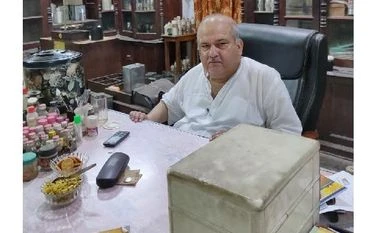‘Jo desh ke liye kaam karega, ham uske liya kaam karenge’ (we will work for the person who works for the country) said Nazim (30), with an air of settling an argument about why he would vote for the Narendra Modi-led Bharatiya Janata Party (BJP).
He had come to the Kannauj police station to report that his motorbike had been stolen, while he was participating in the procession for the nomination of BJP candidate from Kannauj, Suvrat Pathak.
In this constituency, Pathak is facing the former chief minister and Samajwadi Party (SP) supremo Akhilesh Yadav’s wife, Dimple, who is the sitting MP. It is a high-powered contest. What makes it interesting is: the BJP is being supported by a large number of Muslims. Acccording to Nazim, one out of every four Muslim will vote for the BJP.
Data suggests that 7 per cent of the Muslim population voted for the BJP in the 2012 assembly elections and 10 per cent in the 2014 Lok Sabha elections, based on data from Lokniti-CSDS.
But notwithstanding this, it is unusual for Muslims to vote for the BJP, and even more unusual to be seen to be openly supporting a BJP candidate. In Kannauj, Muslims have no qualms about accepting that some of them have, and will continue to vote for the BJP.
This is even more surprising when you consider how much Kannauj has been pampered by the SP. Dimple Yadav lost her very first election from Firozabad against the Congress’s Raj Babbar in 2009 and for Akhilesh Yadav, this was a terrible prestige blow for the young chief minister.
When the Kannauj seat fell vacant in 2012, he got his wife to contest it and she won both in 2012 as well as in 2014, defeating the current BJP candidate Pathak, though the margin of victory was just about 20,000 votes. Dimple got 44 per cent of the vote — and Pathak got 42 per cent. Earlier in the year, Akhilesh’s uncle Shivpal, who has floated his own party, had announced he would field a candidate from Kannauj.
But on the day Dimple filed the nomination, Shivpal withdrew his party’s candidate ‘out of respect for the family’s daughter-in-law’.
If he had stayed in the field, Dimple’s chances would have been seriously in doubt. Now, it is a straight contest between the SP and the BJP.
Between 2012 and 2017 (when Akhilesh had to bow out of UP as chief minister), the state government’s coffers were opened for Kannauj in a way the little town has never seen before — a cancer institute, a hospital, an engineering college, flyovers and roads. Kannauj only had to ask and it was given what it wanted. The town is the site of a forensic laboratory, the fourth largest in India.
It is India’s perfume capital. The industry has everything good to say about the SP and Akhilesh’s tenure as CM. Abhay Tandon presides over a shop that was started by his great great grandfather in 1870. It is a sprawling, dusty empire in a haveli that houses both his business and his home.
He is the sixth generation owner. He has little to thank the BJP for: GST rates on perfume (some perfume is exported to the Middle East, but most of it is used in the pan masala and gutkha industry) have been increased from 5 per cent to 18 per cent.
Sandalwood oil is the main base of Indian perfume. But its use was banned in north India in the 1990s. Highly regulated quantities coming out of south India has affected production. So, sandalwood oil has been replaced with petroleum products such as Di-octyl Phthalate (DOP) or liquid paraffin. This reduces the overall cost, but certainly has a negative effect on quality. And, the increase in tax rate has come as a body blow.
The industry is creative and valiantly struggling against the impact of cheap deodorant and alcohol-based scent.
As chief minister, Akhilesh along with Dimple, visited Grasse in France, where perfumery is a developed industry, and put a collaboration in place between France and India. The Yogi Adityanath government has done little to take this forward.
Till today, labour (the industry provides employment to around 25,000 people, both Muslims and Hindus) travels to a set of remote villages in Hathras (near Aligarh) and Etah where rose and jasmine are grown. During season time, they process the flowers. Rose essential oil or Rooh Gulab costs Rs 15 lakh per kg. Around 37 kg of rose petals (1 maund) yield 8 gms of essential oil. This is then used as a base for perfume.
Industry owners are 60 per cent Hindu and 40 per cent Muslim. Communal riots have never occurred though tension was palpable in 2015 over a Durga Pooja procession. “We work together so we cannot fight” says a Muslim perfumier.
The industry is convinced it will never die, so long as Muslims and Hindus work together.
Unlock 30+ premium stories daily hand-picked by our editors, across devices on browser and app.
Pick your 5 favourite companies, get a daily email with all news updates on them.
Full access to our intuitive epaper - clip, save, share articles from any device; newspaper archives from 2006.
Preferential invites to Business Standard events.
Curated newsletters on markets, personal finance, policy & politics, start-ups, technology, and more.
)